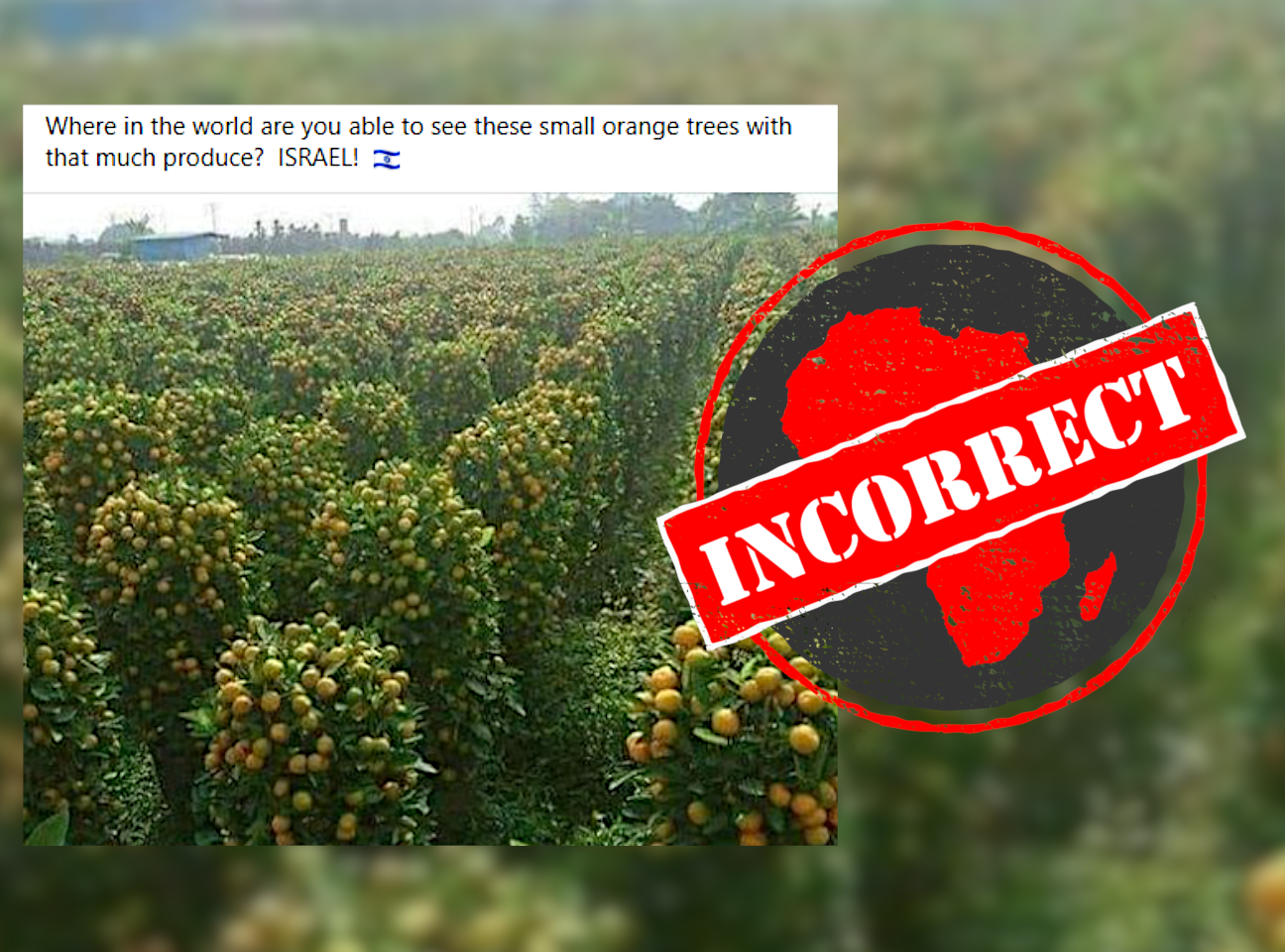A photo of a grove of trees laden with ripe oranges has been shared widely on Facebook in South Africa and the United States, with the claim that it was snapped in Israel.
Its description reads: “Where in the world are you able to see these small orange trees with that much produce? ISRAEL!”
Many of the comments on the post attribute the fruitfulness of the trees to God or to Israel being “the land of milk and honey”. But is there any evidence that this is where the oranges are growing?

A Google image search for the photo did not reveal where it originated, but did show it was shared online much earlier than the 29 November 2020 post.
An Indian Facebook user shared the photo on 8 March 2018, with the caption “Chinese Orange trees garden”. He provided no other details about the photo.
The claim that the photo is from Israel surfaced in November of the same year. Then it was used to illustrate a blog post with the headline “The Blossoming of Israel”, which also saw the fruit trees as “a remarkable sign of God at work in modern day Israel”, but also gave no source for the photo.
In December 2018, a Twitter user based in Kabul, Afghanistan, claimed the same photo showed the “tasty oranges of Nangarhar”, an eastern province of the country.
And on 30 December 2019 the same photo was shared by the Facebook group Beautiful Italy, with the caption “Orange trees in beautiful Italy”.
The photo has also been used to advertise plants for sale in India and to illustrate a blog post about the cultivation of oranges.
It’s unclear where these orange trees are growing. But since we are unable to discover who took the photo, or when, or where, and the same claim has been made about a number of other countries, there is no compelling reason to believe it is from Israel. – Africa Check
Its description reads: “Where in the world are you able to see these small orange trees with that much produce? ISRAEL!”
Many of the comments on the post attribute the fruitfulness of the trees to God or to Israel being “the land of milk and honey”. But is there any evidence that this is where the oranges are growing?

Origin unclear, but could also be from India, Afghanistan or Italy
A Google image search for the photo did not reveal where it originated, but did show it was shared online much earlier than the 29 November 2020 post.
An Indian Facebook user shared the photo on 8 March 2018, with the caption “Chinese Orange trees garden”. He provided no other details about the photo.
The claim that the photo is from Israel surfaced in November of the same year. Then it was used to illustrate a blog post with the headline “The Blossoming of Israel”, which also saw the fruit trees as “a remarkable sign of God at work in modern day Israel”, but also gave no source for the photo.
In December 2018, a Twitter user based in Kabul, Afghanistan, claimed the same photo showed the “tasty oranges of Nangarhar”, an eastern province of the country.
And on 30 December 2019 the same photo was shared by the Facebook group Beautiful Italy, with the caption “Orange trees in beautiful Italy”.
The photo has also been used to advertise plants for sale in India and to illustrate a blog post about the cultivation of oranges.
It’s unclear where these orange trees are growing. But since we are unable to discover who took the photo, or when, or where, and the same claim has been made about a number of other countries, there is no compelling reason to believe it is from Israel. – Africa Check
Republish our content for free
For publishers: what to do if your post is rated false
A fact-checker has rated your Facebook or Instagram post as “false”, “altered”, “partly false” or “missing context”. This could have serious consequences. What do you do?
Click on our guide for the steps you should follow.
Publishers guideAfrica Check teams up with Facebook
Africa Check is a partner in Meta's third-party fact-checking programme to help stop the spread of false information on social media.
The content we rate as “false” will be downgraded on Facebook and Instagram. This means fewer people will see it.
You can also help identify false information on Facebook. This guide explains how.



Add new comment